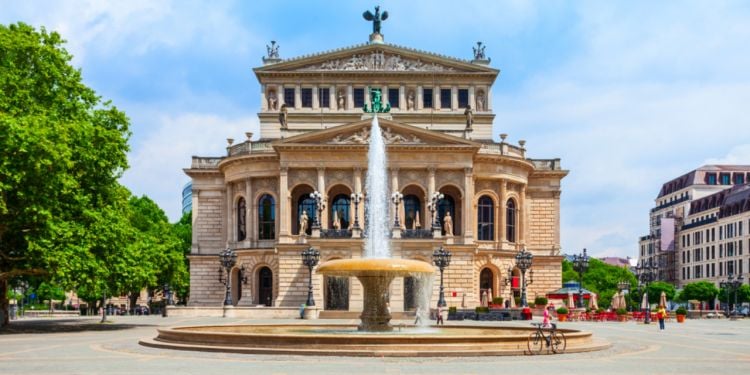
Setting up your life in a new city is challenging. Overall, Frankfurt is not a very difficult environment for expats, as it is pretty international. However, there are specific things that one can familiarize oneself with to integrate into the way of living in Frankfurt and enjoy the city as the locals do. Furthermore, adaptation is important, both for international students and expat professionals looking to blend in the new environment and make the most of their new surroundings. Luckily, living in Frankfurt means having a lot of fun.
About Frankfurt
Frankfurt is not a big city but has a strong business dynamic. This is especially true for those working in the financial sector but is spread to all industries dominating the German state of Hesse. The city is a major commercial and economic center. It is the home to the European Central Bank, the International Frankfurt Stock Exchange, and Germany's busiest airport (and one of Europe's five busiest), which is only 14 km away from the city center. Since Frankfurt is such a significant hub for transnational relations, the English language is widely used, and Frankfurters won't look down upon expats who don't speak German.
Public transport in Frankfurt is very efficient, and future expats should know that driving in Frankfurt or owning a car is not necessary. Another thing to take into consideration is Frankfurt's climate, which is characterized by mild snowfall in winter and highs of 30℃ in summer, but nothing too extreme. In principle, if you love nature, you will love living in Frankfurt because there's so much outdoor adventure near the city, including hiking trails, forests, and views. Note that Frankfurters work hard but also like to take time off, and this balance is the key to their high standard of quality of life.
Good to know:
Frankfurt's full name is Frankfurt am Main, meaning Frankfurt on the River Main. Frankfurt itself derives from the Germanic tribe of the Franks and the word Furt, meaning a shallow place in a river allowing one to cross on foot.
Architecture and culture in Frankfurt
Frankfurt has impressive architecture, which is a blend of tall skyscrapers and nature. The whole city feels very modern and has plenty of fun and good facilities for sightseeing. Frankfurt's Old Town (Altstadt) is a beautiful beginning of a city tour, at the heart of which is a picturesque, irregularly shaped square known as Römerberg. Additionally, the Church of St. Nicholas reflects a great deal of the city's past. Frankfurt has 39 museums of great importance, such as the Historical Museum, the Film Museum, and many art museums. One of Frankfurt's most eminent personalities is the romantic writer Johann Wolfgang von Goethe, whose birthplace was indeed Frankfurt. Hence, it's only fair for Goethe to have his dedicated museum, the Frankfurt Goethe House.
Good to know:
All the cultural institutions are interconnected, and it is possible to see them with one MuseumsUferCard.
Useful links:
The Hesse cuisine in Frankfurt
Whether you are a foodie or you simply like the smell of coffee and spices, the Frankfurt Kleinmarkthalle is a must-visit. This indoor market is a meeting point for locals, and it's easy to understand why. Here, you will find everything food-related, from fruit and vegetables to cheese, wine, organic products, and international delicacies. However, if you want to try local specialties of the region, look for the Frankfurter Grüne Soße Vinaigrette (made of herbs, sour cream, and egg), the traditional sausages, the cheeses, and the sweet Hesse pastries (Frankfurter Kranz). While beer is Germany's signature drink, Frankfurters prefer Apfelwein (apple cider). During the Christmas period, Glühwein (or mulled wine) is a favorite.
Dining out in Frankfurt
Most of the places to eat and casual restaurants don't invite customers to sit. A place is free unless indicated that it is reserved. Most of the waiters speak and understand English, and the menus have English versions. It is pretty common to be asked by the servers (if their shift is about to end) to pay before finishing your meal or drink. Germans tend to leave a 10 to 15% tip for a served meal. They often round it up on the bill or leave cash on the table.
Communication in Frankfurt
Germans, in general, have a very high level of English, and this is also the case in Frankfurt. They are used to communicating with non-German citizens due to the significant expat population and transnational business activities. Thus, if locals notice that you struggle with your German, they will most likely speak English to you directly. Bars and clubs are usually full of friendly people (especially after a few Apfelweins). Still, the working staff may seem more reserved, which is because they give priority to being effective.
How to stay safe in Frankfurt
Frankfurt isn't a popular city for everyone, and not just because it lacks some of the charm of other cities and is geared a little more towards business. It's also one of the most dangerous cities in Germany and has a relatively higher crime rate. This is especially true around the red light district and central station at night. When in crowded places, such as flea markets, be careful with your personal belongings and keep children close to you. Frankfurt neighborhoods such as Gallus and Gutleutviertel are considered unsafe. Even though beauty can be found in all parts of the city, it is best not to take risks, especially if you are not familiar with your surroundings. Apart from the places with a bad reputation, moving around open places in the city is safe and pleasant at any time of the day, so it is possible to visit them and enjoy the Frankfurter way of living.
It's also important to note that, while more dangerous compared to other German cities, Frankfurt is still a safe place to live as long as you follow basic safety procedures.
We do our best to provide accurate and up to date information. However, if you have noticed any inaccuracies in this article, please let us know in the comments section below.








